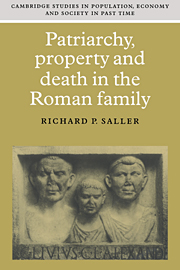Book contents
- Frontmatter
- Contents
- List of tables
- Preface
- Abbreviations
- 1 Introduction: approaches to the history of the Roman family
- Part I Roman life course and kinship: biology and culture
- Part II Roman family and culture: definitions and norms
- 4 Familia and domus: defining and representing the Roman family and household
- 5 Pietas and patria potestas: obligation and power in the Roman household
- 6 Whips and words: discipline and punishment in the Roman household
- Part III The devolution of property in the Roman family
- Bibliography
- Index
- Cambridge Studies in Population, Economy and Society in Past Time
5 - Pietas and patria potestas: obligation and power in the Roman household
Published online by Cambridge University Press: 23 November 2009
- Frontmatter
- Contents
- List of tables
- Preface
- Abbreviations
- 1 Introduction: approaches to the history of the Roman family
- Part I Roman life course and kinship: biology and culture
- Part II Roman family and culture: definitions and norms
- 4 Familia and domus: defining and representing the Roman family and household
- 5 Pietas and patria potestas: obligation and power in the Roman household
- 6 Whips and words: discipline and punishment in the Roman household
- Part III The devolution of property in the Roman family
- Bibliography
- Index
- Cambridge Studies in Population, Economy and Society in Past Time
Summary
The relation of authority, obligation, and coercion within the Roman household constitutes the subject of this chapter and the next. Over the centuries the Roman paterfamilias has served as a paradigm of patriarchal authority and social order; patria potestas has been seen as the embodiment of arbitrary, even tyrannical, power. By “ arbitrary,” I mean here the sort of power a master exercises over his slave, a power more or less unanswerable to higher principles or formal procedures. On this view, Roman family relationships were almost wholly asymmetrical, with power in the hands of the father, and the obligation of obedience imposed on the rest of the household and underwritten by the core family value of pietas. In this chapter I will first analyze how the Romans construed pietas: was it a value designed in such a way as to encourage obedience in asymmetrical relationships between the paterfamilias and other members of the household? Next, the formal elements of patria potestas will be enumerated. Finally, consideration will be given to how those powers were exercised within the field of family obligations, the norms of the wider society, and the social and economic dynamics of the household.
The image of the Roman father endowed with nearly unlimited power over his household goes back to antiquity, especially Greek commentators. Dionysius of Halicarnassus (2.26.4) enumerated the powers that Romulus granted to fathers for life over their children: the power to imprison, to beat, to hold in the country, even to kill their sons.
- Type
- Chapter
- Information
- Patriarchy, Property and Death in the Roman Family , pp. 102 - 132Publisher: Cambridge University PressPrint publication year: 1994
- 6
- Cited by



